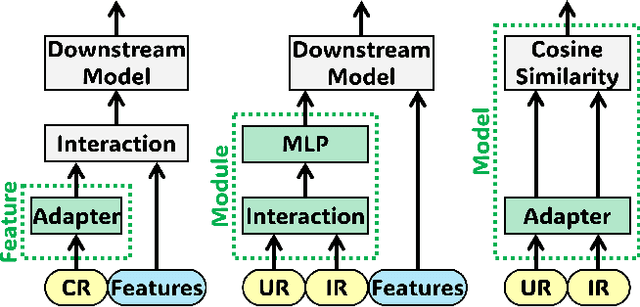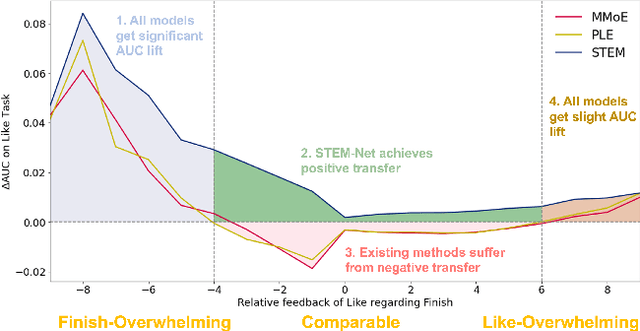Shijie Quan
Large Foundation Model for Ads Recommendation
Aug 20, 2025



Abstract:Online advertising relies on accurate recommendation models, with recent advances using pre-trained large-scale foundation models (LFMs) to capture users' general interests across multiple scenarios and tasks. However, existing methods have critical limitations: they extract and transfer only user representations (URs), ignoring valuable item representations (IRs) and user-item cross representations (CRs); and they simply use a UR as a feature in downstream applications, which fails to bridge upstream-downstream gaps and overlooks more transfer granularities. In this paper, we propose LFM4Ads, an All-Representation Multi-Granularity transfer framework for ads recommendation. It first comprehensively transfers URs, IRs, and CRs, i.e., all available representations in the pre-trained foundation model. To effectively utilize the CRs, it identifies the optimal extraction layer and aggregates them into transferable coarse-grained forms. Furthermore, we enhance the transferability via multi-granularity mechanisms: non-linear adapters for feature-level transfer, an Isomorphic Interaction Module for module-level transfer, and Standalone Retrieval for model-level transfer. LFM4Ads has been successfully deployed in Tencent's industrial-scale advertising platform, processing tens of billions of daily samples while maintaining terabyte-scale model parameters with billions of sparse embedding keys across approximately two thousand features. Since its production deployment in Q4 2024, LFM4Ads has achieved 10+ successful production launches across various advertising scenarios, including primary ones like Weixin Moments and Channels. These launches achieve an overall GMV lift of 2.45% across the entire platform, translating to estimated annual revenue increases in the hundreds of millions of dollars.
Ad Recommendation in a Collapsed and Entangled World
Feb 22, 2024



Abstract:In this paper, we present an industry ad recommendation system, paying attention to the challenges and practices of learning appropriate representations. Our study begins by showcasing our approaches to preserving priors when encoding features of diverse types into embedding representations. Specifically, we address sequence features, numeric features, pre-trained embedding features, as well as sparse ID features. Moreover, we delve into two pivotal challenges associated with feature representation: the dimensional collapse of embeddings and the interest entanglement across various tasks or scenarios. Subsequently, we propose several practical approaches to effectively tackle these two challenges. We then explore several training techniques to facilitate model optimization, reduce bias, and enhance exploration. Furthermore, we introduce three analysis tools that enable us to comprehensively study feature correlation, dimensional collapse, and interest entanglement. This work builds upon the continuous efforts of Tencent's ads recommendation team in the last decade. It not only summarizes general design principles but also presents a series of off-the-shelf solutions and analysis tools. The reported performance is based on our online advertising platform, which handles hundreds of billions of requests daily, serving millions of ads to billions of users.
STEM: Unleashing the Power of Embeddings for Multi-task Recommendation
Aug 16, 2023



Abstract:Multi-task learning (MTL) has gained significant popularity in recommendation systems as it enables the simultaneous optimization of multiple objectives. A key challenge in MTL is the occurrence of negative transfer, where the performance of certain tasks deteriorates due to conflicts between tasks. Existing research has explored negative transfer by treating all samples as a whole, overlooking the inherent complexities within them. To this end, we delve into the intricacies of samples by splitting them based on the relative amount of positive feedback among tasks. Surprisingly, negative transfer still occurs in existing MTL methods on samples that receive comparable feedback across tasks. It is worth noting that existing methods commonly employ a shared-embedding paradigm, and we hypothesize that their failure can be attributed to the limited capacity of modeling diverse user preferences across tasks using such universal embeddings. In this paper, we introduce a novel paradigm called Shared and Task-specific EMbeddings (STEM) that aims to incorporate both shared and task-specific embeddings to effectively capture task-specific user preferences. Under this paradigm, we propose a simple model STEM-Net, which is equipped with shared and task-specific embedding tables, along with a customized gating network with stop-gradient operations to facilitate the learning of these embeddings. Remarkably, STEM-Net demonstrates exceptional performance on comparable samples, surpassing the Single-Task Like model and achieves positive transfer. Comprehensive evaluation on three public MTL recommendation datasets demonstrates that STEM-Net outperforms state-of-the-art models by a substantial margin, providing evidence of its effectiveness and superiority.
 Add to Chrome
Add to Chrome Add to Firefox
Add to Firefox Add to Edge
Add to Edge